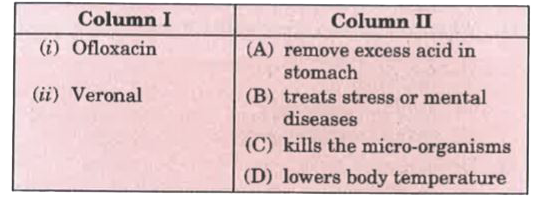.Consider the following statements:
P: I have fever
Q: I will not take medicine
R:1 will take rest.
The statement " If I have fever, then I will take medicine and I will take rest " is equivalent to :
(P∨Q)∨((~P)∨R)
(P∨~Q)∧((P∨~R)
(~P)∨~Q∧((~P)∨~R)
((~P)∨~Q)∧((~P)∨R)
The correct Answer is:D
To solve the problem, we need to analyze the given statements and translate them into logical expressions.
Step 1: Understand the statements
We have three statements:
- P: I have fever
- Q: I will not take medicine
- R: I will take rest
The statement we need to analyze is: "If I have fever, then I will take medicine and I will take rest."
Step 2: Translate the statement into logical form
The statement can be expressed in logical terms:
- The phrase "If I have fever" translates to P.
- The phrase "I will take medicine" can be expressed as ¬Q (since Q is "I will not take medicine").
- The phrase "I will take rest" translates to R.
Thus, the entire statement can be written as:
P⟹(¬Q∧R)
Step 3: Apply logical equivalences
Using the implication equivalence, we can rewrite P⟹(¬Q∧R):
P⟹(¬Q∧R)≡¬P∨(¬Q∧R)
Step 4: Use distribution
Now we can distribute the terms:
¬P∨(¬Q∧R)≡(¬P∨¬Q)∧(¬P∨R)
Step 5: Final expression
Thus, the final expression we derived is:
(¬P∨¬Q)∧(¬P∨R)
Step 6: Identify the equivalent statement
Now, we can check which of the provided options matches this expression.
Conclusion
After analyzing the options, we find that the correct equivalent statement is:
¬P∨¬Q∧¬P∨R
We have three statements:
- P: I have fever
- Q: I will not take medicine
- R: I will take rest
The statement can be expressed in logical terms:
- The phrase "If I have fever" translates to P.
- The phrase "I will take medicine" can be expressed as ¬Q (since Q is "I will not take medicine").
- The phrase "I will take rest" translates to R.
P⟹(¬Q∧R)
Using the implication equivalence, we can rewrite P⟹(¬Q∧R):
P⟹(¬Q∧R)≡¬P∨(¬Q∧R)
Now we can distribute the terms:
¬P∨(¬Q∧R)≡(¬P∨¬Q)∧(¬P∨R)
Thus, the final expression we derived is:
(¬P∨¬Q)∧(¬P∨R)
Now, we can check which of the provided options matches this expression.
After analyzing the options, we find that the correct equivalent statement is:
¬P∨¬Q∧¬P∨R
Topper's Solved these Questions
Similar Questions
Knowledge Check
- Question 1 - Select One
Consider the following statements
I.The pHAI and IIBI, II and IIICII and IIIDI, II and IV - Question 2 - Select One
Consider the following statements
P : I have the raincoat q : I can walk in the rain.
The propositions " If have the raincoat , then I can walk in the rain " is represented byAp→qBp v qCp ^ qDp↔q - Question 3 - Select One
Consider the following propositions :
P : I take medicine , q : I can sleep
Then , the compound statement ~p→~q meansAIf I do not take medicine, then I cannot sleepBIf I do not take medicine, then I can sleepCI take medicine iff can sleepDI take medicine if I can sleep
"I'll take the risk.” What is the risk? Why does the narrator take it?
View SolutionShe said, "I will now take rest for some time."
View SolutionConsider the following statements:
p : I shall pass, q : I study
The symbolic represention of the proposition " I shall pass iff I study" isView SolutionMatch the medicine (column I) with its use (column I) .
 View Solution
View SolutionI take exception to your statement that I am bad tempered.
View Solution

